
Just when you thought that the world was slowly slipping away from the crippling recession that had it in its vice-like grip since 2008, here comes the Irish economic crisis.
On Monday, ending weeks of opposition to a European Union bailout, heavily-indebted Ireland finally agreed with the European Union and the International Monetary Fund on a multi-billion euro rescue package to avert bankruptcy.
Ireland will be the first country to receive financial support from the Euro 750 billion (nearly a trillion dollars) financial safety net, spread by the EU and the IMF six months ago, to help euro zone nations facing liquidity crisis.
It was set up after debt-ridden Greece slipped to the verge of a bankruptcy in May and had to be rescued by a euro 110 billion lifeline from the EU and the IMF.
The level of assistance for Ireland from the Financial Stability Facility will be decided during the negotiations with the EU and the IMF in the coming days, but European Commission sources in Brussels indicated that it could be between Euro 80 billion and Euro 100 billion.
The agreement on the second bailout of a euro zone nation within six months came after the Irish cabinet at an emergency meeting in Dublin decided Sunday night to make a formal request for a financial assistance from the EU, which it rejected until a few days ago.
Additional inputs: PTI
. . .
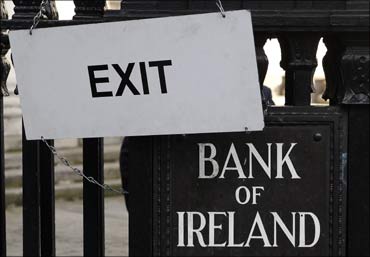
Just what went wrong
Actually, Ireland's troubles are not really very recent. The country is in deep economic trouble with a government deficit of 14.3 per cent of GDP. The recession-hit economy plunged further with the collapse of the construction industry. The cumulative fall in GDP over three years has been 12 per cent in real terms.
Ireland, once called the Celtic Tiger, was for long a bubble waiting to burst. The amalgam of ample credit at pathetically low interest rates, cheap real estate, and recklessness of the common Irishman made for an ideal sub-price crisis that has now pushed the country to the brink of bankruptcy.
Add to it the nexus between politicians, builders and bankers, who are now being held responsible for turning the Celtic Tiger into a mouse.
With the recession setting in and people losing their jobs, most big borrowers were unable to service their loans. Homes of people who could not repay their loans were repossessed, but by that time the cat was out of the bag and real estate prices plummetted.
This resulted in banks being unable to recover their money by selling the repossessed homes as property values crashed.
. . .

So what is the problem now?
Banks were laden with an unmanageable burden of loan-defaults and finally collapsed under the weight of gargantuan bad debt.
Now the country wants to borrow money to prop up its economy, but it's easier said than done. The nation's borrowing costs have soared to stratospheric levels. Ireland now has to pay extremely high interest rates (close to 10 per cent) to borrow from global markets so that the nation's public expenditure could be met.
Global lenders want the surety that Ireland will pay them back in time, but the nation's huge fiscal deficit and the recessionary winds that continue to buffet the nations do not really inspire confidence that it would be able to meet its interest payments. Thus they charge even higher interest rates, making it all the more difficult for Ireland.
High interest rates also cripple private Irish firms as their access to global financial markets is severely hampered, not to mention the fact that the country's credit rating too is significantly downgraded. With investment taking flight from the country, job losses increase and this is what has further debilitated Ireland's economy.
Since this is an absolutely unsustainable situation, an Unemployment rates too have shot up to 13 per cent. The Guardian newspaper said that an 'EU-led bailout of the banks seemingly a foregone conclusion and the Irish government expects 100,000 skilled workers to leave the country over the next four years'.
. . .

'The new wave of emigration will be a blow to a country which only a few years ago was urging its Diaspora to consider returning to work for the 'Celtic Tiger,' the newspaper added.
The Irish government will need more than $70 billion to underwrite its failing financial institutions. This is one half of the nation's GDP.
Ireland can find money from the European Financial Stability Facility, a $1,000-billion fund set up after Greece went bankrupt. But fears are that Ireland might not be able to meet its debts.
Ireland faced yet another problem. It did not want to borrow either from the European Union or the IMF as there would certainly be certain riders linked to the bailout offer that would eventually lead to a rise in taxes. The nation's low tax rates have attracted many a global corporation to set shop there.
"I confirm today that the government decided that Ireland apply for an assistance from the European Union," Prime Minister Brian Cowen told a news conference after the cabinet meeting on Monday.
. . .
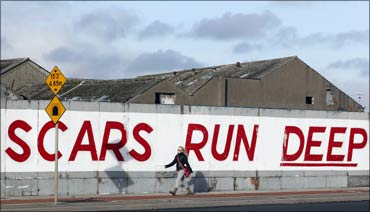
He said the government's request was transmitted to the European authorities in the evening and "they have agreed to our request".
Cowen said a formal negotiation on the level of EU aid and other aspects of the bailout will begin now on the basis of a programme worked by the government of Ireland, the EU, the IMF and the European Central Bank during four days' discussions in Dublin.
He said he expected an agreement to be finalised within the next few weeks.
The government will have to fulfil certain conditions, including drastic spending cuts, in return for the bailout and they may be unveiled when the negotiations are expected to be completed by the end of this month.
However, Ireland's low corporate tax of 12.5 per cent, which has been a bone of contention with its EU partners, will not be increased, Cowen said.
. . .
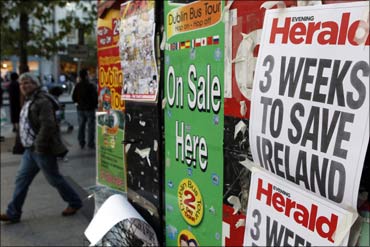
The finance ministers of the 16 euro zone nations, who held a telephone conference while the Irish cabinet was meeting, also confirmed that the "Celtic Tiger" will be bailed out with the support of the EU and the IMF.
Ireland got into financial trouble after it spent more than euro 45 billion to rescue the country's banks, which faced bankruptcy following the collapse of the once booming property business.
This pushed up the country's budgetary deficit to a staggering 32 per cent of the GDP this year, the highest among the euro zone nations and 10 times the limit set by the EU's growth and stability pact.
The Irish government's borrowing costs rose sharply in the past weeks as investors became concerned about its ability to service its debts.
But the country's financial woes are much deeper than believed until now.
. . .
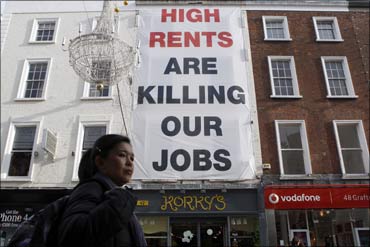
Ireland's Finance Minister Brian Lenihan admitted on Sunday that the country needs the EU's financial assistance not only to shore up the battered banks, but also to cover a 19 billion euro shortfall in this year's budget.
Until last week, he insisted that the government is "fully funded till mid-2011".
Ireland came under mounting pressure from several EU partners and the European Commission to seek a bailout from the EU.
They feared that its debt crisis could spill over to other financially-troubled nations such as Portugal and Spain and could threaten the stability of the euro zone as happened during the Greek debt crisis.
The finance ministers of the euro zone nations expressed relief that Ireland finally decided to ask for a EU financial rescue.
. . .
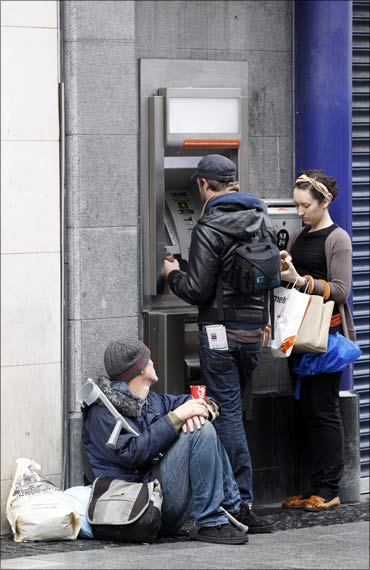
"The ministers agree with the European Commission and the European Central Bank that their support for Ireland is necessary to protect the financial stability in the EU and in the euro area," they said in a joint statement.
German Finance Minister Wolfgang Schaeuble welcomed the Irish government's decision to seek financial rescue by EU.
As the Irish debt crisis deepened in the past weeks, the risk of a contagion in the euro area was great and therefore the EU urged the government in Dublin to apply for a bailout, he said in a television interview.
The euro zone rescue fund was created to help member-nations which are in financial difficulties and thereby preserve the stability of the euro zone.
"This is not about defending a single country, but about defending the common currency," he said.
. . .
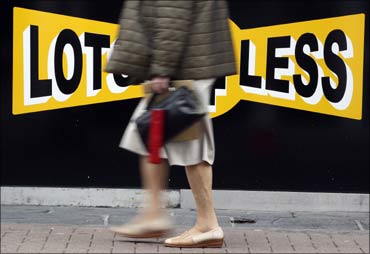
Ireland will have to fulfil certain stringent conditions to receive the assistance and they will be negotiated in the coming weeks, Schaeuble said.
These conditions are necessary to tackle some of the problems, which caused the present crisis, he said.
Cowen said Ireland's banks will become smaller as part of a restructuring of the banking industry.
Another main focus of the rescue package will be to reduce budgetary deficit to 3 per cent of the GDP by 2014.
The Irish cabinet on Sunday agreed on a programme to save up to Euro 15 billion over the next four years through spending cuts.